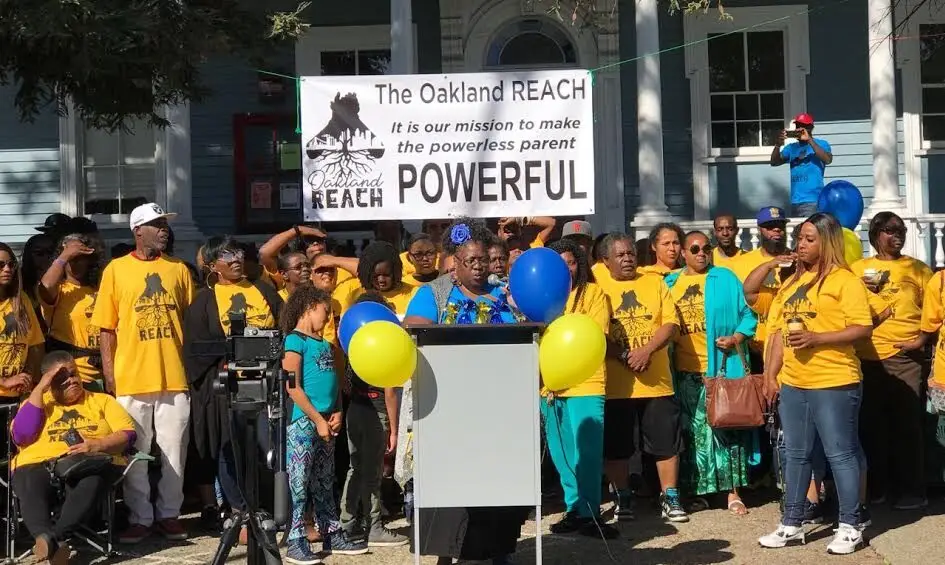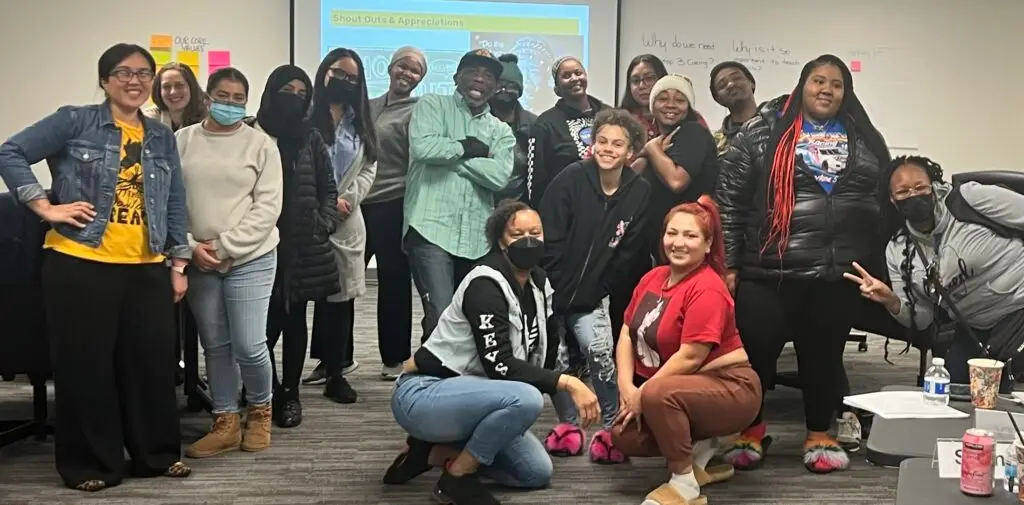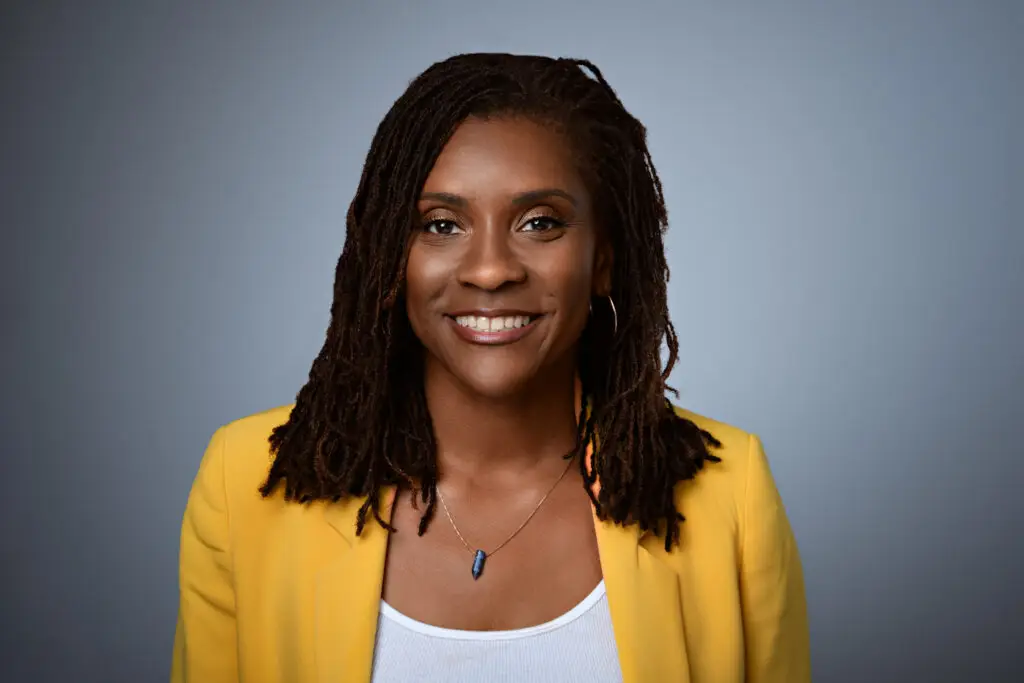People in Action: Leaders changing minds and communities
The Center on Reinventing Public Education’s research often uncovers people with ideas or solutions that are worthy of a bigger stage. Our People in Action series offers space for leaders to explain—in their own words— how they’re addressing the critical needs of students in the hope of building a more equitable, joyful, and resilient public education system.
We invited parent advocacy leader Lakisha Young, founder and CEO of The Oakland REACH, to write a series of first-person accounts about organizing parents in Oakland, California, to work toward increasing Black and Brown student achievement. We detailed The REACH’s approach in a case study as part of our research on pandemic pods and microschools. She is currently a senior fellow at CRPE. This is the third blog in a six-part series.
For six years, The Oakland REACH has built and sustained innovative models of education because we understand that parents have to be part of the solution. Everything we build comes from our families. We ask. We listen. We build. We liberate. That’s our formula.
In 2019, we asked our families about their needs and aspirations for their children’s education. We heard over and over again that their children’s inability to read kept them up at night. Our families know that if their children can’t read, there is a potential prison bunk waiting for them. And right now, less than 30% of Black and brown kids in the Oakland Unified School District are reading on grade level.

It’s not a new problem. Take one of our founding parents, Connie Williams. Connie, also known as “Mama Williams,” graduated from Oakland schools more than 40 years ago despite not knowing how to read. She then watched Oakland schools fail her children — they graduated unprepared for college or careers. Now, she says she will die before she lets that be the reality for her grandkids. Business as usual clearly won’t get our kids reading. That’s why the REACH set out to always do things differently.
Following the success of our first policy win, the Opportunity Ticket, we launched a citywide campaign in 2019 that was driven by our parents’ concerns around reading. We brought together a coalition of more than 30 community organizations to advocate for the science of reading — reading instruction that is proven to work. Our campaign, Literacy for All, was unique not only because it was led by parents, but also because it went beyond focusing on early literacy outcomes and targeted increasing the literacy of the whole family — including the mamas and grandmamas. We knew the only way to truly address the city’s literacy crisis in a sustainable way was to uplift and heal the whole family around generations of failed education outcomes.
In February 2020, our coalition took Literacy for All to the Oakland Unified School District (OUSD) Board of Education, which passed a resolution 7-0 in support of the initiative. This was important because it included a commitment to shift to effective research-based literacy instruction for all students.
One month later, the pandemic hit our city. With a strong network of parents equipped with proven, powerful advocacy skills around literacy, The REACH was in a position to deliver a fierce response. The week schools shut down, we were able to turn to our families and ask, “What do you need to make sure your child doesn’t fall further behind?”
Many schools and teachers have long taught children to read in a fashion that’s at odds with research from cognitive scientists. In her American Public Media podcast series, Sold a Story, reporter Emily Hanford breaks down how and why this happened.
We listened to what they said: They wanted additional high-quality instruction for their children, specific and rigorous literacy tutoring, and help accessing online learning. And over two months, we designed, built, and launched a virtual Family Hub that provided all of that. The results speak for themselves: In our first summer, June 2020, we offered 75 hours of rigorous literacy instruction that resulted in impressive academic gains. About 60% of students in REACH’s literacy programming moved two or more levels on the district’s reading assessment; 30% of students moved three or more levels. That’s right, not only did they avoid pandemic learning loss — our kids were moving ahead. This was the first time many of our families experienced learning gains for their children. Talk about liberation!
Developing the Liberator Model
A huge part of the Hub’s success were our literacy tutors, paraprofessionals working in our district and charter schools. Most of them were made up of mamas and aunties from our communities. This inspired the launch of our Liberator Model in 2021, which focused on literacy. Through the Hub, we discovered that parents and caregivers are willing to go above and beyond when it comes to accessing a high-quality education for their children. And we wanted to build a framework that leveraged this discovery. Our Liberator Model trains parents and caregivers to be paid tutors who can provide high-dosage tutoring in some of the lowest-performing schools in Oakland.
We named this work our Liberator Model because it frees families from the burden of living in perpetual survival mode. That’s because this model integrates both economic mobility and academic aspirations, including:
- Academic support: Liberators provide high-dosage tutoring during the school day.
- Economic mobility: Liberators are paid, with the option of full-time hours and benefits.
- Workforce development: Liberators gain marketable skills by mastering technology such as Google Tools and Salesforce. They also learn presentation and communication skills.
- Talent pipeline: Liberators are untapped talent that can fill national teacher shortages.
- Social and emotional learning (SEL): Liberators, parents and caregivers from our communities, provide students and families with a sense of agency and belonging.
Literacy Liberator Fellowship
We knew the parents, aunties, and cousins in our community are powerful assets, but we also knew they would need curriculum training. That’s why we worked with OUSD to create a partnership with a nonprofit partner, FluentSeeds, to provide literacy training. We coupled this training with leadership development and culture building so fellows graduated prepared to lead in classrooms.
Our fellowship is pivotal in supporting OUSD to reach the reading by third grade goal, set in the district’s strategic plan, to hire 90 literacy tutors. Our recent cohort of graduates brings the district to this total number — there will be 90 tutors serving more than 5,500 K-2 students in our highest-need schools by June.

Over the coming months, we’re focused on ensuring that all Liberators have the necessary support to deliver for our kids. In partnership with FluentSeeds and OUSD, we will be participating in site visits and interviews with Liberators to assess results. We are also building out our model to focus on performance and retention of this new talent pipeline. And we’re excited to partner with The Center on Reinventing Public Education, which will be documenting lessons from our model for a national audience. This is an incredible opportunity to show the world what can happen when everyone works together on behalf of kids.
We know the Liberator Model is the literacy solution communities need — because it was built by the community. It was informed by our approach — ask, listen, build, and liberate. That’s the blueprint to disrupt poverty with privilege and to free ourselves from a status quo that has failed us for generations.
No more business as usual.





Don’t engage families: Liberate them
Lakisha Young
Senior Fellow